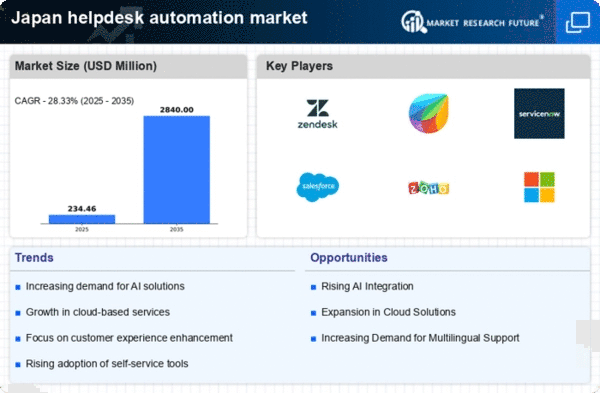Growing Focus on Cost Reduction
In Japan, businesses are increasingly focused on cost reduction strategies, which is driving the growth of the helpdesk automation market. Organizations are recognizing that automating support processes can lead to substantial savings in operational costs. Studies indicate that companies implementing helpdesk automation can reduce support costs by up to 20%, allowing them to allocate resources more effectively. This financial incentive is compelling many firms to invest in automation technologies, thereby propelling the helpdesk automation market forward as a viable solution for enhancing efficiency while minimizing expenses.
Integration of Advanced Analytics
The integration of advanced analytics into helpdesk automation systems is transforming the landscape of customer support in Japan. By leveraging data analytics, organizations can gain insights into customer behavior and preferences, allowing for more personalized service. Reports suggest that businesses employing analytics-driven helpdesk solutions see a 25% increase in first-contact resolution rates. This capability not only improves operational efficiency but also fosters a deeper understanding of customer needs. As the helpdesk automation market evolves, the emphasis on data-driven strategies is likely to become a critical driver, enabling companies to tailor their services and improve overall customer engagement.
Shift Towards Remote Work Solutions
The shift towards remote work has significantly impacted the helpdesk automation market in Japan. With an increasing number of employees working from home, organizations are seeking automated solutions that facilitate seamless communication and support. This trend has led to a 40% rise in the adoption of cloud-based helpdesk systems, which offer flexibility and accessibility. As companies adapt to this new work environment, the helpdesk automation market is likely to see continued growth, driven by the necessity for tools that support remote teams and ensure uninterrupted service delivery.
Increased Regulatory Compliance Requirements
The helpdesk automation market in Japan is also influenced by the rising regulatory compliance requirements across various industries. As businesses face stricter regulations regarding data protection and customer privacy, the need for automated systems that ensure compliance becomes critical. Helpdesk automation solutions can streamline processes to maintain compliance, reducing the risk of penalties and enhancing trust with customers. This trend is particularly relevant in sectors such as finance and healthcare, where adherence to regulations is paramount. Consequently, the helpdesk automation market is likely to expand as organizations seek to implement solutions that not only improve service delivery but also safeguard against compliance risks.
Rising Demand for Efficient Customer Support
The helpdesk automation market in Japan is experiencing a notable surge in demand for efficient customer support solutions. As businesses strive to enhance customer satisfaction, the need for automated systems that can handle inquiries swiftly and accurately becomes paramount. Recent data indicates that companies utilizing helpdesk automation report a 30% reduction in response times, which directly correlates with improved customer retention rates. This trend is particularly evident in sectors such as retail and telecommunications, where customer interactions are frequent and complex. The helpdesk automation market is thus positioned to grow as organizations increasingly recognize the value of investing in technology that streamlines support processes and enhances user experience.
















